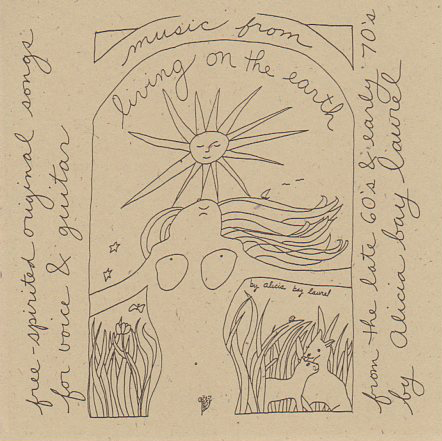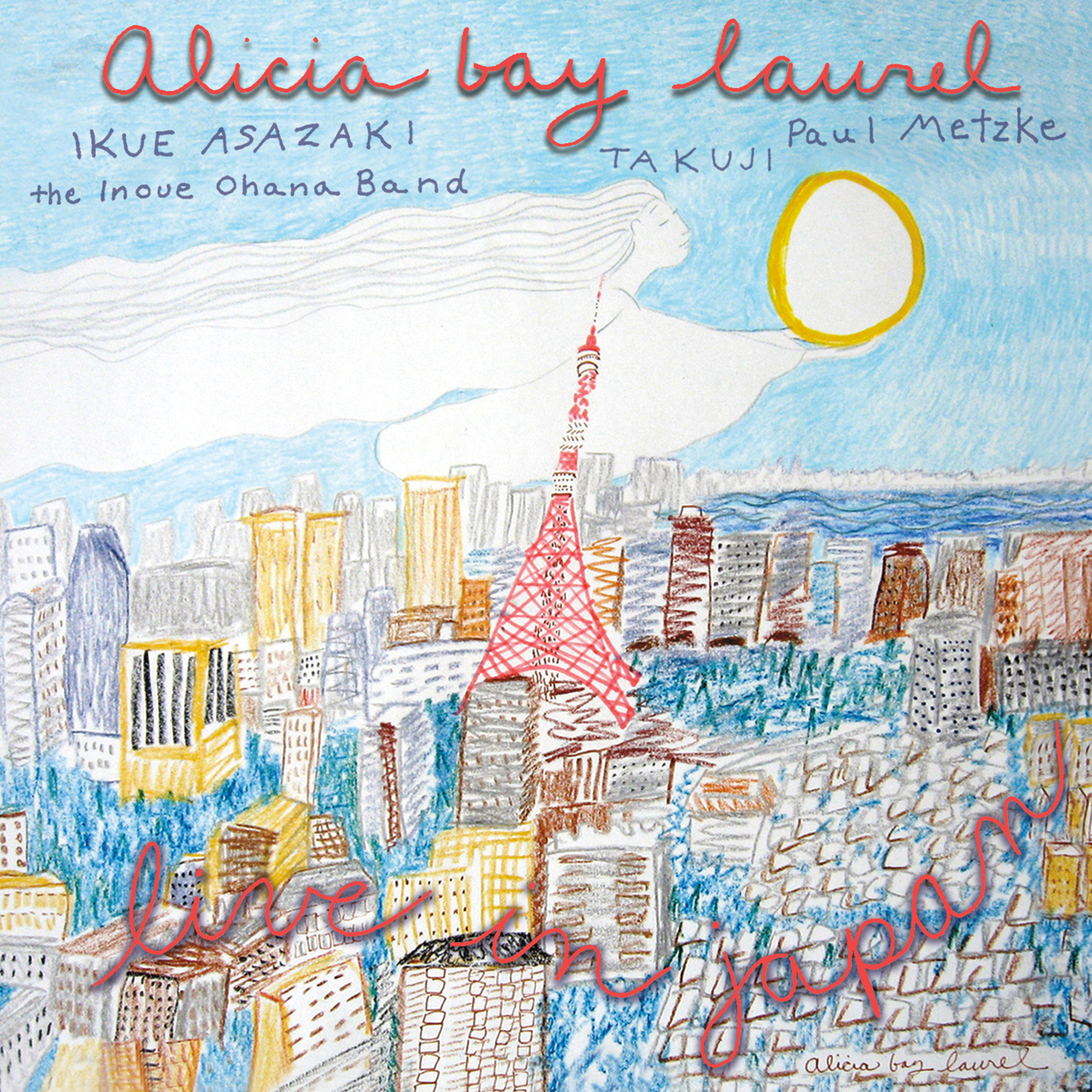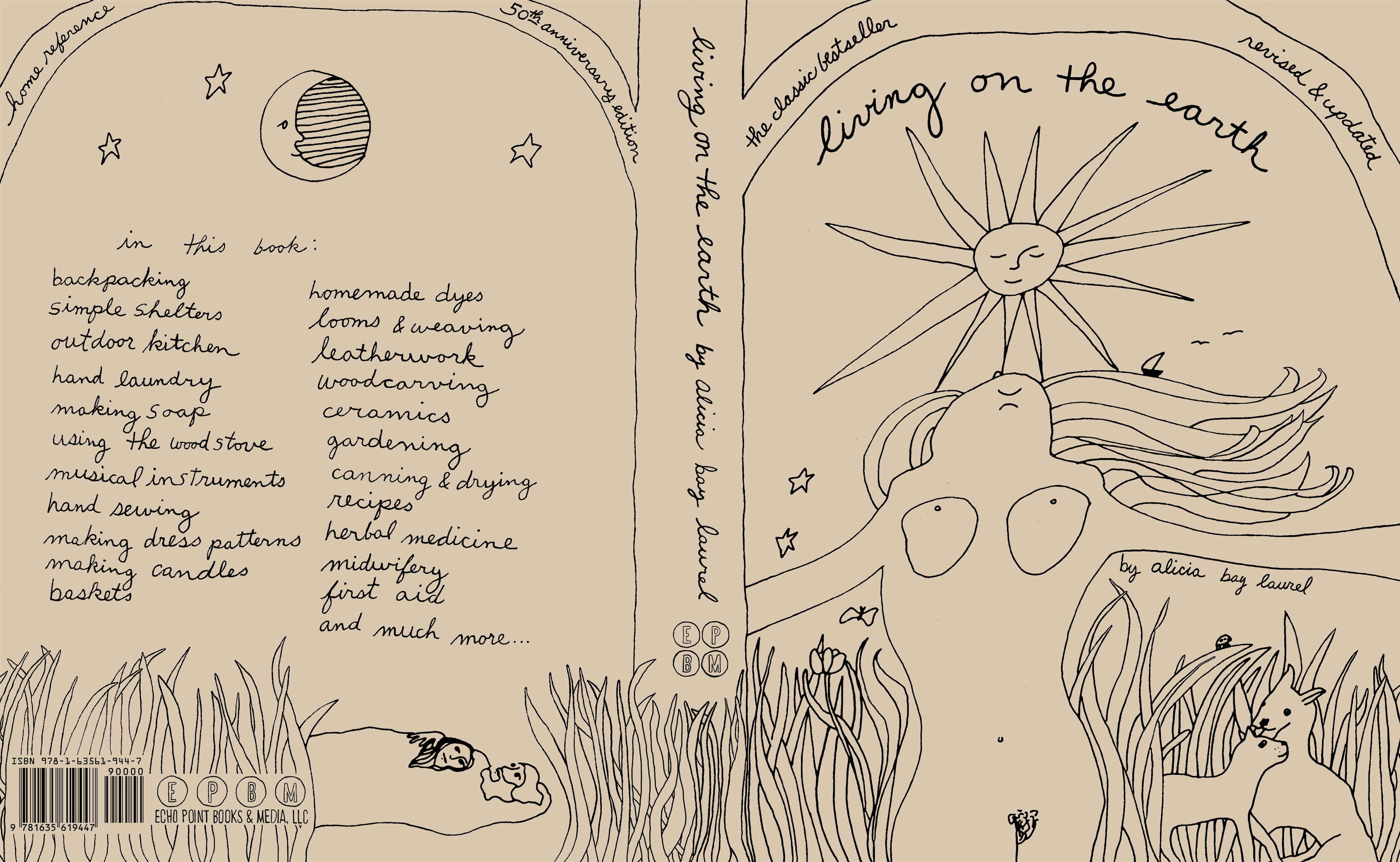
Review by H.V. Cramond for Feminist Review, March 28, 2010
As the title of this album suggests, Beyond Living is a collection of folk songs about death, many of them written by musicians who have passed. Alicia Bay Laurel, known for her 1971 guide to sustainable living entitled Living On Earth, collected and recorded many of the songs on this album in response to a number of deaths she encountered in recent years, including, most notably, legendary Japanese singer-songwriter Takashi Donto Kudomi, who died in 2001 at a hula performance. Songs from artists from several countries round out this decidedly international album.
While the album’s theme might suggest darkness, the album feels more like a celebration. As Laurel’s liner notes suggest “lyrics about death contain valuable instructions for living,” and these songs are no exception. Their cheery melodies, vocals, and a fingerpicked guitar mix with deep sadness in the manner I associate with children’s songs (Remember when you found out “Ring-Around-the-Rosie” was about The Plague?) The album invites the listener to engage with the certainty of death and to feel the relish that reality brings to living. Much like listening to the blues, listening to these songs provides a deep and pleasurable access to human emotion.
Review by multi-platinum-selling singer/songwriter Joe Dolce in his weekly newsletter, sent 09-25-09:
What I’m Listening to This Week
‘Beyond Living’ – Alicia Bay Laurel. This is the most recent release of my friend, Alicia Bay Laurel, with whom Lin Van Hek and I will be performing with in Okinawa and Tokyo next month. Alicia is one of the few real visionary freaked-out flower children from the 70s who has grown even further into the great dream of the Beloved Community that we all shared back then. She also had a Number One hit, so to speak, in her 20s, with a New York Times best-selling book, Living on the Earth, which changed her life, and it is an inspiration to know someone who continues to reinvent herself – without disowning her past.
Alicia and I were also both close to, and sang with, the girl who introduced me to California hippie communes back in the 70s, Janet ‘Sunny’ Supplee, and the spirit of Sunny hovers throughout this recording. Sometimes, listening to Alicia sing, I swear Sunny is in the building. Sunny and I sang together for a couple of years and she certainly influenced me in an unforgettable way. She was killed in a car crash in Maui and I still miss her.
Beyond Living collects a master’s bouquet of beautiful songs about Death that do not drag death down into the valley of shadow and fear where old time religion would like to keep it penned up, but releases it out into the empowering light and flight of warm meadows and possibilities. Alicia has included the song I wrote and sang at my own father’s funeral, Hill of Death, with lyrics by Australian feminist pioneer, Louisa Lawson, drunken Henry’s mum.
While in LA, I was lucky enough to be able to sing and play with her on this recording. I was surprised at first when the tasty, awesome, I-am-the-Fingers-of-God mandolin part I had recorded was nowhere to be found in the final mix, but after a couple of listens, I understood why it went to the cutting room floor (along with Satan, Everlasting Hell and the Edsel.) It’s not necessary. Alicia’s last album, What Living’s All About, was an eclectic brew of styles, electric guitar solos, even rap – but this one, a unique fusion of Hawaiian and Japanese sensibility, is smoothly unified by the continuity of Alicia’s lullaby-like singing and precision finger-picking guitar, the latter most notably in the fifteen minute closing instrumental, Ruminations, which is a collage of no less than fifteen tunes: Amazing Grace, The Garden, Is This Not the Land of Beulah, Will the Circle Be Unbroken, Oh Come Angel Band, Gathering Flowers for the Master’s Bouquet, Angels Are Watching Over Me, This Little Light of Mine, Swing Low Sweet Chariot, Bosan Gokko, Hill of Death, Long Black Veil, Good Night Irene, We Shall All Be Reunited, and Kumbaya – and leading to the final Hawaiian, Aloha Oe’. I wouldn’t mind at all having these fifteen minutes playing in my final hour.
There are also three tracks written by Takashi Donto Kudomi, a legendary Japanese new wave rock star turned spiritual singer/songwriter, who died mysteriously on January 23, 2001. He, his wife and their two young sons were watching a hula performance dedicated to Pele, the volcano goddess, at Hawaii Volcanoes National Park. At the end of the final chant, Donto fell to the ground unconscious, and was rushed to the hospital. The next day he was pronounced dead at age 37 from a brain aneurism. He had been in perfect health until that day. We will be staying and singing with Donto’s widow, Sachiho, in Okinawa, at Donto-in, the temple Sachiho built in his honor.
One of my favourite tracks is the quirky Altid Frejdig Naar du Gaar (Courage Always When You Walk) with melody by C.E.F. Weyse, 1838, lyrics: Christian Richardt, 1867, set into verse by Alicia. It is often sung at funerals in Denmark and is faithfully sung here in Danish. Just voice and stand-up bass, played masterfully by Chris Conner and reminiscent of her great version of Nature Boy, on What Living’s All About, the vocal seems to float in and out of ordinary tonality like a ghostly dandelion puff. One day, I do hope Alicia gets a chance to put out an album of just vocal and stand-up bass recordings, as they are always a pleasure, and a challenge, to listen to.
Review by Gerald Van Waes, host of “Psyche Van Het Folk” (a psychedelic folk radio show in Antwerp, Belgium) on his website, November 20, 2009
Alicia Bay Laurel : Beyond Living (US, 2009)
A bit different from Alicia’s previous albums, this is a conceptual piece of songs to be meant as a tuning in to a spiritual good vibration and feeling, on moments when people have passed over. When Alicia suddenly saw many related and befriended people pass over, it seemed as if she had no other option but to give all this an accompanying meaning; she started to collect songs from different countries to express this.
It starts strongly, with a Hawaiian opening chant which leads to a song inspiration, as a special moment (or person) to remember. The second song is an Australian folk gospel song, a folk version in which the backing vocals gives an Americana gospel feeling. Next we hear a traditional Japanese song, accompanied by harmonium and congas and vocals. Also this one has gospel flavours, reminiscent a bit of ‘Amazing grace’, being a more delicate, religious almost Christmas-sphere sphere. After its vocal parts with high voices (in Japanese), there’s some spoken word by Alicia giving more reference in the song. “Waltzing with Angels” sounds more like a country children song with a Hawaiian effect on the way the mandolin is played, with a happy feeling or energy. The song with original Danish lyrics by Christian Richardt (1867) is sung with a Marilyn Monroe song voice, and accompanied with bass only.
“The Garden” is again more countryesque, is sung with nice dual voices, leaving a Hawaiian feeling. “Auntie Nona” sounds like a happy children’s song, old music. The next small song has more religious Christian lyrics which appeal less to me. Also here gospel and country-flavours are mixed nicely. “Nami” turns back to Japan but leaves traces of Hawaii. On “Ruminations” we finally return to the “Amazing Grace” song, turning after a short while into a slow Hawaiian guitar medley on acoustic guitar. Also the last instrumental is a guitar piece with references to
Hawaiian melodies.
Except as a dedication to the subject, the album is as much a dedication to spheres provoked from Hawaiian songs and music, to spirituality in gospel music, as quietly privately experienced music, and the fresh kindness of children songs, and a touch of country. All of this is omnipresent throughout with a happy inner strength and positivism towards life and thankfulness to people and their lives.





You must be logged in to post a comment.